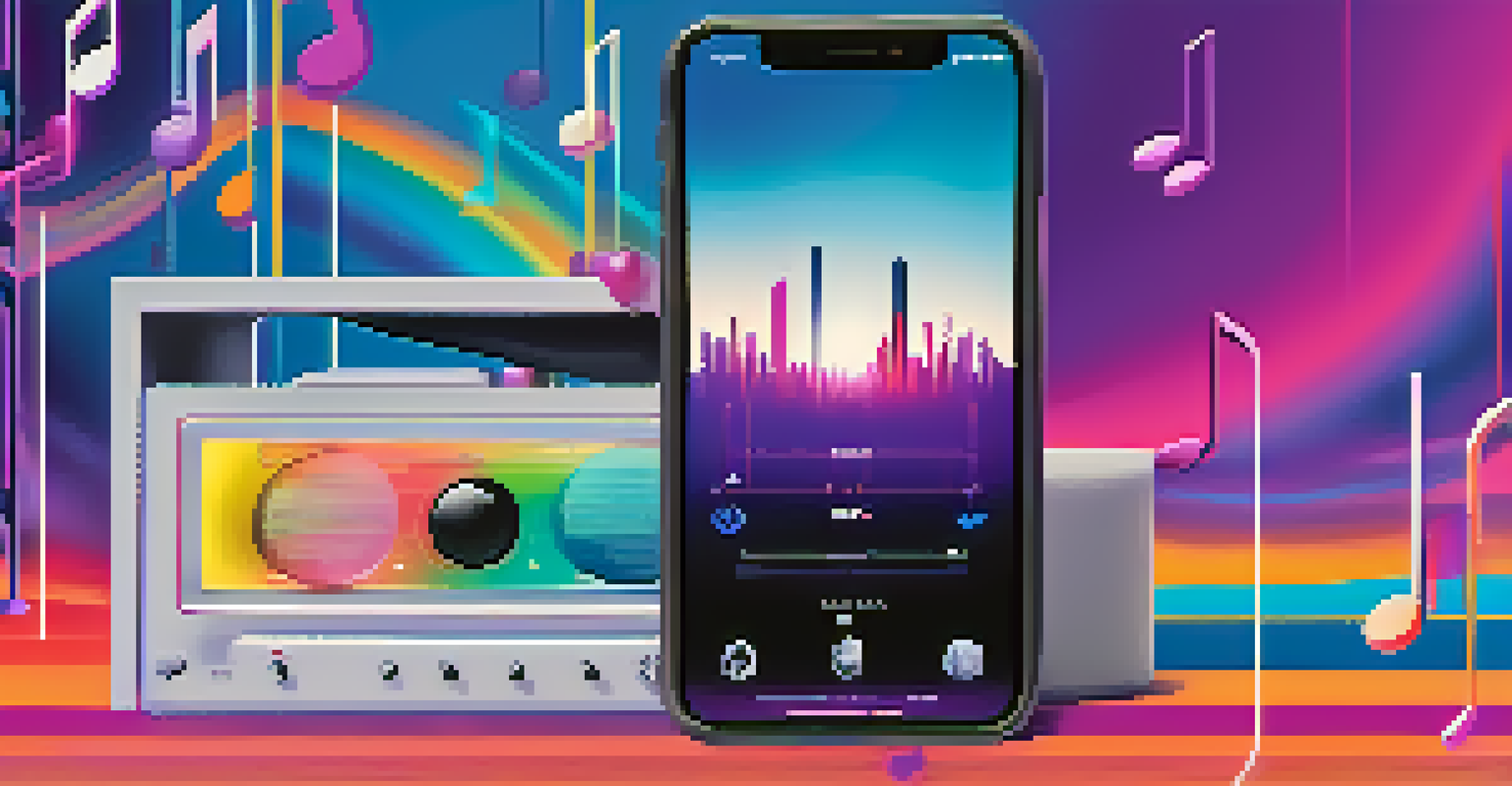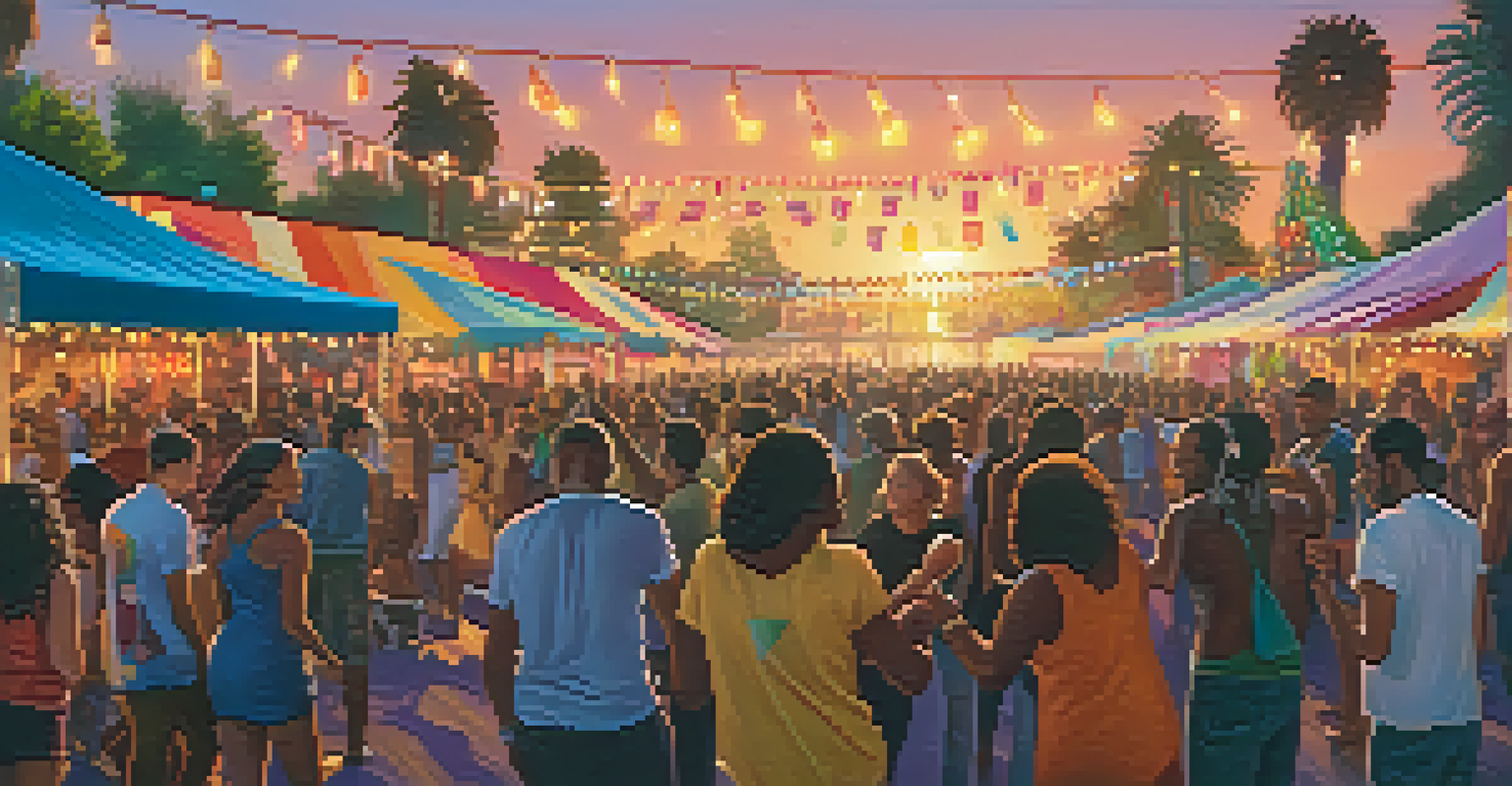Analyzing Music Consumption Trends in the Digital Age

The Shift from Physical to Digital Music Formats
In the past, music lovers relied heavily on physical formats like CDs and vinyl records. The tactile experience of flipping through album covers and carefully placing a needle on a record was part of the joy. However, with the rise of digital technology, streaming services have taken center stage, making music more accessible than ever before.
Music can change the world because it can change people.
Today, platforms like Spotify and Apple Music allow users to access millions of songs instantly, transforming how we listen to music. This shift has not only changed consumption habits but also how artists release their work, with many favoring singles over full albums to maximize streaming potential. As a result, the music industry has seen a significant decline in physical sales, leading to a need for artists to adapt.
This transition from physical to digital formats has also democratized music distribution. Independent artists can now share their music globally without the need for a record label, giving rise to a diverse array of genres and sounds that reflect a wide range of cultural influences.
The Rise of Streaming Services and Their Impact
Streaming services have revolutionized how we consume music, providing an endless library at our fingertips. Users can curate personalized playlists, discover new artists, and enjoy music without the hassle of downloads or storage limitations. This convenience has shifted the focus from album-oriented listening to a more casual, playlist-driven approach.

Moreover, streaming platforms use sophisticated algorithms to analyze user behavior, which helps in music discovery. These recommendations can lead listeners down new musical paths, introducing them to genres and artists they might not have explored otherwise. This personalized experience has made music consumption more engaging and tailored to individual tastes.
Shift to Digital Music Formats
The transition from physical formats to digital streaming has transformed how we access and consume music.
However, the popularity of streaming also raises questions about artist compensation. Many musicians struggle to earn a sustainable income from streaming royalties, prompting discussions about fair pay and the future of the music industry. Balancing accessibility for listeners while ensuring artists can thrive is a challenge that continues to evolve.
Changing Listening Habits: From Albums to Playlists
The way we listen to music has seen a significant transformation, particularly with the advent of curated playlists. Listeners are now more likely to enjoy a mix of songs rather than commit to a full album, reflecting a preference for variety and immediate gratification. This shift has cultivated a culture of 'snacking' on music, where quick, enjoyable bursts of sound dominate.
The wonderful thing about music is that it can take you to places you’ve never been before.
Playlists serve as a modern-day mixtape, allowing users to share their musical tastes and craft their own listening experiences. Whether it's a workout playlist or a chill-out mix, these collections often reflect specific moods or activities, making music a more integral part of daily life. This personalization enhances the emotional connection between listeners and their favorite tracks.
As a result, artists are increasingly focusing on creating standout singles that fit well within playlists, rather than traditional album formats. This trend raises questions about the longevity of music as an art form, as the pressure to produce hits may overshadow the creative process behind full-length albums.
Social Media's Role in Music Discovery
Social media platforms have become a vital tool for music discovery in the digital age. Sites like TikTok and Instagram allow users to share snippets of songs, often leading to viral trends that can launch an artist's career overnight. This dynamic interaction between music and social media has fundamentally altered how we find and share music.
In addition to creating buzz around new releases, social media platforms enable artists to connect directly with their fanbase. They can share behind-the-scenes content, engage with followers through live sessions, and promote their music in a more authentic way. This direct access fosters a sense of community and loyalty among fans.
Streaming Services Redefine Listening
Streaming platforms have changed music consumption habits, promoting playlists over albums and raising concerns about artist compensation.
However, the rapid pace of social media trends can also pose challenges. Artists must continuously adapt to keep up with changing algorithms and audience preferences, which can sometimes detract from their creative focus. Balancing promotional efforts with artistic integrity is crucial in navigating this complex landscape.
The Impact of Artificial Intelligence on Music Consumption
Artificial intelligence (AI) is making waves in the music industry, influencing everything from song recommendations to music creation. AI algorithms analyze vast amounts of data to suggest tracks that listeners might enjoy, enhancing the personalized experience of streaming services. This technology not only helps listeners discover new music but also aids artists in understanding audience preferences.
Additionally, AI is being used to create music, generating compositions that mimic various genres and styles. This development raises intriguing questions about the nature of creativity and the role of human artists in an increasingly automated world. While AI-generated music can be impressive, it often lacks the emotional depth that comes from human experience.
As AI continues to evolve, it will be essential for the music industry to find a balance between technological innovation and the artistry that makes music so powerful. Integrating AI responsibly could enhance music consumption while preserving the soul of the art form.
Globalization and the Influence of World Music
In today's interconnected world, music transcends borders more easily than ever before. Globalization has allowed diverse musical styles to reach new audiences, enriching the listening experience for many. Genres such as K-pop, Reggaeton, and Afrobeat have gained immense popularity, showcasing the power of cultural exchange in shaping music trends.
Streaming platforms play a crucial role in this globalization, providing a space for artists from different backgrounds to share their music. As listeners become more open to exploring international sounds, they often find themselves drawn to rhythms and melodies that reflect different cultures and experiences. This exposure fosters a greater appreciation for diversity in music.
Social Media Enhances Music Discovery
Social media plays a crucial role in music discovery, enabling artists to connect with fans and making it easier for songs to go viral.
However, this trend also raises questions about cultural appropriation and the commercialization of global music styles. As artists borrow from one another, it’s essential to ensure that cultural integrity is respected and that the original creators receive recognition. Striking a balance between celebration and respect is key to fostering a truly global music community.
The Future of Music Consumption: What Lies Ahead?
As we look to the future, it's clear that music consumption will continue to evolve in response to technological advancements and changing listener preferences. Emerging technologies like virtual reality and immersive sound experiences are beginning to reshape how we engage with music. These innovations promise to create more interactive and engaging listening experiences.
Moreover, the rise of blockchain technology could revolutionize how artists distribute their music and receive compensation. By providing a transparent and secure method for transactions, artists may gain more control over their work and earnings, potentially leading to a fairer system in the industry. This technology represents a significant shift in the relationship between artists and their audiences.

Ultimately, the future of music consumption will likely be characterized by a blend of technology, social connections, and artistic expression. As we navigate this ever-changing landscape, one thing remains certain: music will continue to be a vital part of our lives, adapting and thriving in new forms.